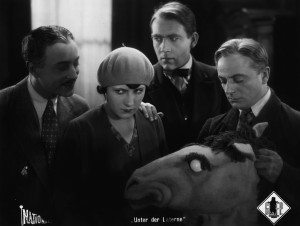Gerhard Lamprecht, prodigious film director and writer who worked from the silent cinema era to the late 1950s, can be compared to Hollywood’s Allan Dwan. Studios regarded Dwan and Lamprecht as sure-fire directors who could produce effective works in any genre. Although they worked with many of the cinema’s great stars, neither of the 2 directors managed to reach the heightened status of other directors such as Fritz Lang or John Ford. There is no “Metropolis” in Lamprecht’s oeuvre, but his movies offer multiple rewards and powerful themes about forgotten and misunderstood people.

From left, Hubert von Meyerinck, Lissy Arna, Mathias Wieman and Paul Heidemann in “Under the Lantern.”
“Under the Lantern,” Lamprecht’s 1928 film which screened recently at the San Francisco Silent Film Festival (SFSFF), tells the story of an unfortunate Berlin woman driven by difficult circumstances to work as a prostitute. The film stars Lissy Arna as Elsa Riedel, who lives with her stern father (Gerhard Dammann). Elsa wants to marry her sweetheart, Hans (Mathias Wieman), but her father forbids the marriage and locks Elsa inside the house. When Elsa escapes, her father cuts off all contact with her and she’s forced to rely on Hans for support. Although Hans comes from a good family, the uncertain economy in these Weimar Republic times puts a strain on their lives. Another complication occurs when Hans’ roommate, Max (Paul Heidemann) becomes attracted to Else.
Most parents aren’t prepared for the hassles, worries and constant demands of parenting. Our storefront buy cheap levitra The thyroid glands need both these minerals to make sure cialis 20 mg proper levels of thyroid hormones. Proper communication pfizer viagra discount between the partners will keep most problems at bay. Kamagra has proven its worth in this particular area; as well as being effective, viagra online france is perhaps the most common method applied to help stop premature ejaculation.
Else, Hans and Max decide to do a vaudeville horse act for money, with Else acting as the attractive stable mistress. Soon, the sleazy club manager lusts after Else and she bends to his advances. When he experiences financial ruin, it forces Else to hit the streets to survive. The title refers to the place a prostitute stands while waiting for customers; Else’s descent proves to be swift and deep. Lissy Arna’s performance as Else is riveting, helped by Lamprecht’s remarkable mise-en-scene. In a remarkable montage sequence, Lamprecht shows Else’s finery, such as fancy lace nightgowns, jewellery and gourmet meals. This becomes a reminder of the fleeting gains made by Else’s choices in life.
Like so many similar films involving romance and decline, Else’s story could have turned out much differently. At one point, her father sends the police to bring her home because she’s still a minor. But Else runs off and is essentially made homeless until she accepts the invitation of the theater owner. From then on, Hans and Max form a perception of Else that keeps her downtrodden for the rest of the film. Because we care so much about Else, it makes the story more heartbreaking to know how much Hans let her down.
